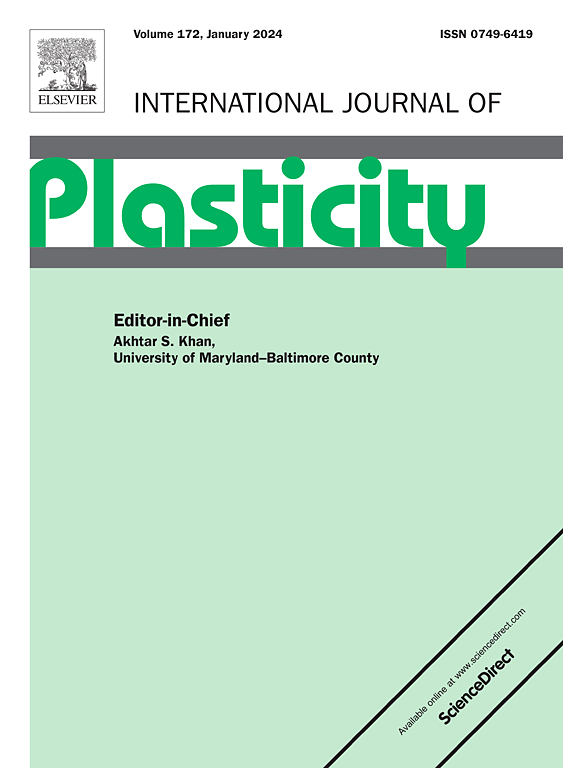应变梯度晶体塑性的快速傅立叶变换方法:应变局部化和尺寸效应的正则化
IF 12.8
1区 材料科学
Q1 ENGINEERING, MECHANICAL
引用次数: 0
摘要
应变梯度晶体塑性(SGCP)以累积剪切应变为基础,用于规范和模拟多晶聚集体的尺寸效应行为,特别是在塑性变形初始阶段受应变软化影响而形成的滑移带和扭结带。在这方面,介绍了 SGCP 方程的热力学一致推导,建立了它们与经典晶体塑性(CCP)框架运动学的联系。利用快速傅立叶变换(FFT)均质化方法的定点算法求解了支配平衡方程,其中涉及经典平衡方程和 SGCP 平衡方程之间的显式耦合。为解决这一问题,建立了一个强 21 象素有限差分方案。该方案用于解决 SGCP 固有的高阶平衡方程。此外,还实施了三种界面条件,以探索晶界对局部带传输的影响。在 MicroFree 和 MicroContinuity 条件下,这些条件产生了一致的粒内/跨粒局部化模式,而在 MicroHard 条件下,所有局部化带都是粒内的,应力集中出现在晶界处。据观察,CCP 框架中的宏观行为和微观变量都受到网格分辨率(非目标)的很大影响,从而导致单晶和多晶聚集体中材料软化和随后形成局部带所引起的数值不稳定性。值得注意的是,所开发的 SGCP 模型提供的结果与网格分辨率(客观)无关,并有效地规范了局部尺度上的材料行为。此外,该模型的非局部参数能够控制局部带宽。最后,所提出的 SGCP 模型与晶界上采用的 MicroHard 条件一起,证明可以定性地再现辐照多晶材料的主要微观结构特征。本文章由计算机程序翻译,如有差异,请以英文原文为准。
Fast Fourier transform approach to Strain Gradient Crystal Plasticity: Regularization of strain localization and size effect
The Strain Gradient Crystal Plasticity (SGCP) model, based on cumulative shear strain, is developed to regularize and simulate the size effect behavior of polycrystalline aggregates, specifically addressing the formation of localization bands, such as slip and kink bands, influenced by strain softening during the initial stages of plastic deformation. In this respect, the thermodynamically consistent derivation of the SGCP equations is presented, establishing their connection to the kinematics of classical crystal plasticity (CCP) framework. The governing balance equations are solved using the fixed-point algorithm of the fast Fourier transform (FFT)-homogenization method, involving explicit coupling between the classical and SGCP balance equations. To address this problem, a strong 21-voxel finite difference scheme is established. This scheme is considered to solve the higher order balance equation inherent to SGCP. Additionally, three types of interface conditions are implemented to explore the impact of grain boundaries on the transmission of localization bands. These conditions yield consistent intragranular/transgranular localization patterns in the MicroFree and MicroContinuity cases, while in the MicroHard condition all localization bands are intragranular with stress concentrations appearing at the grain boundaries.
Analytical solutions corresponding to different material behaviors are developed and compared with numerical results to validate the numerical implementation of the FFT fixed-point algorithm. It is observed that both the macroscopic behavior and microscopic variables in CCP framework are highly influenced by grid resolutions (non-objective), leading to numerical instabilities arising from the material softening and subsequent formation of localization bands, both in single crystals and polycrystalline aggregates. Remarkably, the developed SGCP model provides results that are independent of grid resolutions (objective) and effectively regularizes the material behavior on local scale. Moreover, the non-local parameter of the model is capable of controlling the localization band widths. Finally, the proposed SGCP model, together with employed MicroHard condition on grain boundaries, is demonstrated to qualitatively reproduce main microstructural features of irradiated polycrystalline materials.
求助全文
通过发布文献求助,成功后即可免费获取论文全文。
去求助
来源期刊

International Journal of Plasticity
工程技术-材料科学:综合
CiteScore
15.30
自引率
26.50%
发文量
256
审稿时长
46 days
期刊介绍:
International Journal of Plasticity aims to present original research encompassing all facets of plastic deformation, damage, and fracture behavior in both isotropic and anisotropic solids. This includes exploring the thermodynamics of plasticity and fracture, continuum theory, and macroscopic as well as microscopic phenomena.
Topics of interest span the plastic behavior of single crystals and polycrystalline metals, ceramics, rocks, soils, composites, nanocrystalline and microelectronics materials, shape memory alloys, ferroelectric ceramics, thin films, and polymers. Additionally, the journal covers plasticity aspects of failure and fracture mechanics. Contributions involving significant experimental, numerical, or theoretical advancements that enhance the understanding of the plastic behavior of solids are particularly valued. Papers addressing the modeling of finite nonlinear elastic deformation, bearing similarities to the modeling of plastic deformation, are also welcomed.
 求助内容:
求助内容: 应助结果提醒方式:
应助结果提醒方式:


